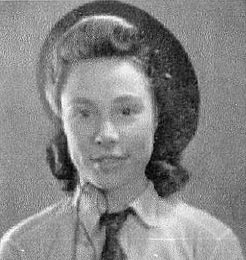|

Barbara Sear at the tender age of 19 pictured in July 1942 wearing her new Land Army uniform which included a beige blouse, dark green tie and hat.
|
Having lived all of her 19 years at Finchley, North London, Mrs Barbara Cranfield, or rather Barbara Sear as she was then, was delighted to adventure out into the Sussex countryside in pursuit of aiding her fellow countrymen during World War II.
'On January 11th 1943, my friend Betty Shelford and I were sitting in a small carriage on Hailsham Station, waiting for the train to start its journey to Lewes. We were about to start a new phase in our lives.
Our friendship had begun 6 months before, when new and pale and green; we'd joined the Land Army and had been sent to join a gang of girls working on farms in the Hailsham area.
We had begun with hoeing, 20 girls in a row hoeing sugar beet (it was soon noticeable who were the slackers, bringing up the rear!). We hoed beet and potatoes, pulled flax, helped with harvesting, stooking barley and throwing sheaves up on to wagons.
We had picked up potatoes in damp October fields and pulled and trimmed sugar beet in November fogs. Now we were off to pastures new, to the Plumpton School of Agriculture to learn to milk cows, rear calves and generally husband a dairy herd. We were glad to leave Hailsham behind.
At Lewes we boarded the country bus that ran along under the Downs to Westmeston and beyond. It put us down at the college gates. The college itself looked like a large low building covered with ivy that could easily have been a big private house. It lay on one side of the road with its fields around it, and on the other side, the Downs rose up, palely winter green, with clumps of Wayfaring trees or shows of beeches in hollows.
We thought, after the privations of our billets in Hailsham, that we had awakened in heaven, each in a small warm room with hot, available baths (only 4 inches of hot water per person), and when we sat to meals in the great dining room we were waited upon at the table by smiling women in aprons.
Our first morning began at 5.15 am when one of the staff knocked noisily on our doors and said 'Get up'. We proceeded up the path in the dark, past the ancient old Plumpton Church, to the farmyards and cow stalls and the dairy.
The lesson we learned that morning was about the weight of milk. It is very heavy and we carried bucket after bucket of it from the cow stalls to the dairy. Then we learned about buckets - they must be cleaned, washed first in cold water, to removed the dung, then in hot soda water, to remove the grease and finally in hot water to rinse.
The young woman in charge of us was very hot on hygiene! When we had scrambled about 'helping' this young woman scrub and sluice her premises we had turns at trying to 'milk' the big rubber udders filled with water. It was fairly easy to squeeze the water from those big teats, milking a real cow was another matter.
After breakfast we worked in the milking sheds, filling barrows with dung which the young men of the staff trundled out to the great dung-heaps, and then came more scrubbing and swilling down - no shortage of water luckily. Our muscles grew as we worked.
We had 4 weeks at the college. Our time was mostly spent with the cows, and we learnt to milk on those that were quiet and gentle and didn't give much milk. Arms and wrists ached and the smell of cow stalls clung to us unforgivingly, but some days we were on stable duty and spent time with beautiful shire horses, grooming them while the staff fed them.
They looked down on us with such gentle benign eyes, and I remember crawling between their legs with utter trust in order to brush the feathers on their almighty feet.
In the evenings we had lectures and I found it was a pleasure to take notes and write essays, and absorb new facts. We helped feed calves and watched while a tractor was mended, (getting very cold feet!) and humped mangolds from clamp to manger.
On one occasion we climbed the Downs to where a cow (grazing with others on the hill) had calved. The calf was dead but we brought down the cow successfully in spite of our ineptitude, while the man we were with carried the calf back in a sack. Our first lesson in the ups and downs of farming!
And so to the end of our stay, and we had learned to milk a cow, had handled calves and fed them 'with fingers' in buckets, had heaved milk and scrubbed a hundred floors.
We'd also had a wonderful time! I look back on my month at Plumpton with great pleasure. My friend Betty and I parted afterwards, I to a farm to work, she to be married to her Canadian boy. Life was full of Good-byes in the Nineteen-Forties.'
Barbara Cranfield (nee Sear) now lives at Mannings Heath near Horsham in West Sussex.
| |


